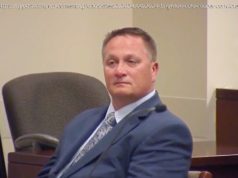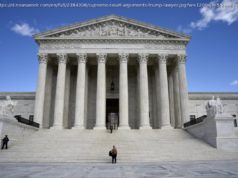The accusations against the Supreme Court nominee are being assessed under different social and cultural conventions than when the episode allegedly occurred
It was 36 years ago. The accusation: There was a party, alcohol. A 17-year-old boy was drunk and started groping a 15-year-old girl, pinning her down and covering her mouth so she couldn’t scream. Today, she doesn’t remember some of the details. He insists it didn’t happen at all.
It was 36 years ago. The culture: What 15-year-old girl would tell her parents she had been at a party where kids had been drinking, much less that a boy had attacked her?
It was 36 years ago. The country: Ronald Reagan was president. The Supreme Court had only one female associate justice, its first, Sandra Day O’Connor. It was nine years before the Clarence Thomas hearings, where the spectacle of an all-male Senate panel casting doubt upon Anita Hill would provoke the outrage that drove a record number of women to run for — and win — congressional office.
A very different United States is now deep into a debate over how long-ago allegations involving teenagers and alcohol should be regarded and treated in the confirmation process of the accused, Judge Brett M. Kavanaugh, in his nomination to the Supreme Court.
It’s unclear where the confrontation is headed: the Senate Judiciary Committee has called both Judge Kavanaugh and his accuser, Christine Blasey Ford, to testify before the Senate Monday, but she has not committed to appearing.
Both Democrats and Republicans have to carefully consider how their response affects their strategy just seven weeks before a midterm election where women are crucial voters. Democrats have to worry about older women and those who have raised teenagers, who may be skeptical that an allegation from adolescence should doom a person as an adult, no matter what they think of this pick by President Trump. Republicans have to be mindful of generational shift that has made the country far more vigilant on matters of sexual misconduct, and of the women demanding that the allegations made by Dr. Blasey, now a research psychologist in Northern California, be taken seriously.
No matter their differing viewpoints, scholars, advocates for women’s rights, politicians and others see enormous consequence in reckoning with adolescent behavior during a high court fight in an unusually combustible election year.”
“This is going to come back to bite women, I promise you,” said Kay Hymowitz, a senior fellow at the Manhattan Institute, a conservative think tank, and the author of “Manning Up: How the Rise of Women Has Turned Men Into Boys.” “Teenage girls do crazy, stupid things also. Even if they have not attempted a rape, they will have done other stupid things. There’s a lot of confusion about what we expect of kids, boys and girls, when it comes to sex.”
Others argued that while it is reasonable to put the allegations in context — if they are true, he was just a teenager, that argument goes — Judge Kavanaugh is not up for an ordinary job.
“I would be very troubled if someone were about to go to jail for something like this that happened 40 years ago,” said Nancy Gertner, a retired federal judge who has written extensively in defense of women’s rights in sexual harassment and sexual assault. Still, she said, “With respect to the Supreme Court you’re dealing with an elite position which is a privilege to be confirmed for. And arguably the standards are much higher.”
Judge Gartner noted that she had raised two teenagers — “teenage boys are nuts,” she said — and she has seen how allegations, even when found to be false, can unfairly tarnish young men. Last year, she and three other Harvard Law School professors urged the Department of Education to reassess Obama-era guidance to colleges on dealing with allegations of sexual assault, arguing they had encouraged colleges to adopt definitions of misconduct that are “seriously overbroad.”
“Should she be believed? I don’t know,’’ she said. “What does one do about an accusation that is this old? I’m not sure. But you’re talking about a different kind of position.”
Much hangs in the balance. Judge Kavanaugh would fill what has been a swing seat on the court, and would likely be a decisive vote on for a strengthened conservative majority. The midterm elections on Nov. 6 could flip control of the Senate, giving Democrats the power to veto any of Mr. Trump’s nominees for the next two years.
The allegations also come in a defining political moment for women, who are energized as voters and running for Congress in record numbers — in both cases, mostly as Democrats. It’s far different than 1991, when Ms. Hill reluctantly made allegations of sexual harassment against Judge Thomas during his Supreme Court confirmation hearings. The male senators who cast doubt on her were a bipartisan group — almost unthinkable in today’s polarized setting. And a cultural reckoning on sexual assault in recent years — in the Catholic Church, in elite boarding schools, and in the highest ranks of Hollywood — has established that crimes committed several decades ago are crimes all the same.
At the very least, politicians now understand that a woman’s allegations needs to be heard, and that most women would have a hard time coming forward. Dr. Blasey has said that it was only years later, while in therapy, that she fully understood the attack as attempted rape, and she still struggled for months over making the allegations public, knowing that women who make such allegations open themselves up to shaming and doubt.
None of those senators casting doubt on Ms. Hill — Republican or Democrat — saw the reaction coming: how anger among women turned the 1992 midterms into the so-called “Year of the Woman.”
This year, the outrage was there well before Judge Kavanaugh was even nominated: It started with Hillary Clinton’s loss in 2016 and swelled through the women’s marches and the #MeToo movement. “We’re not looking at this as being the spark of mobilization, we’re looking at this as being the fuel on top of an already burning fire,” said Corrine McConnaughy, who teaches political science at George Washington University and public policy at the University of North Carolina-Chapel Hill.
“Democratic sitting senators who might have personal reasons to be dismissive of a sexual assault claim from several decades ago have constituent concerns they didn’t know existed in ’92,” she said. “They’re more aware of how Democratic women in particular are viewing this and they’re also increasingly aware that women are fueling the Democratic Party.”
Mr. Kavanaugh and his Republican sponsors seemed aware of the climate, too: he took pains to present himself at his hearings as a champion of female law clerks and a coach to young female athletes. He insisted that he considered Roe v. Wade settled law.
But in the face of the allegations from Dr. Blasey, Republicans may see some benefit to doubling down on polarization and gender division.
Already, some were stoking what Dr. McConnaughy called a “careful, all the ladies are coming for you” strategy.
Politico quoted an anonymous lawyer “close to the White House” as saying, “If somebody can be brought down by accusations like this, then you, me, every man certainly should be worried.






